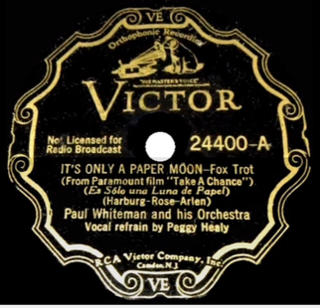"Because" is a song with music and lyrics by Guy d'Hardelot and English lyrics by Edward Teschemacher, originally published in 1902.
"Wanted" is a popular song written by Jack Fulton and Lois Steele. A recording by Perry Como was the most popular version, reaching No. 1 in the US. Al Martino also recorded a version which reached No. 4 in the UK.
"'A' You're Adorable" is a popular song with music by Sid Lippman and lyrics by Buddy Kaye and Fred Wise, published in 1948.
"Temptation" is a popular song published in 1933, with music written by Nacio Herb Brown and lyrics by Arthur Freed.
"If (They Made Me a King)" is a popular song with music written by Tolchard Evans and the lyrics written by Robert Hargreaves and Stanley J. Damerell. The song was written in 1934, but the most popular versions were recorded in 1950–1951. Perry Como's version, recorded November 28, 1950, was a number-one hit on the Billboard charts for eight weeks. The Como version was released under the following labels and catalog numbers:
"Dear Hearts and Gentle People" is a popular song published in 1949 with music by Sammy Fain and lyrics by Bob Hilliard. The song refers to the singer's hometown, and different versions allude to a range of U.S. states.
"Prisoner of Love" is a 1931 popular song, with music by Russ Columbo and Clarence Gaskill and lyrics by Leo Robin.

"It's Only a Paper Moon" is a popular song published in 1933 with music by Harold Arlen and lyrics by Yip Harburg and Billy Rose.
"Cuddle Up A Little Closer, Lovey Mine" is a popular song. The music was written by Karl Hoschna, the lyrics by Otto Harbach. The song was published in 1908. From the Broadway musical Three Twins when it was introduced by Alice Yorke.
"The One I Love (Belongs to Somebody Else)" is a popular song composed by Isham Jones with lyrics by Gus Kahn. The song was recorded by Isham Jones' Orchestra on December 21, 1923, at Brunswick Studios in New York City, and published on January 7, 1924. On January 17 in Chicago, Jones recorded another version, with Al Jolson on lead vocals. Both versions made the charts that Spring, with Jolson's peaking at number 2, and Jones' at number 5. Sophie Tucker recorded her version February 1924, released on Okeh 40054.
"So Far" is a show tune from the 1947 Rodgers and Hammerstein musical Allegro when it was introduced by the character "Beulah" played by Gloria Wills.
Lou Handman was an American composer.
"Everything I Have Is Yours" is a popular song. The music was written by Burton Lane, the lyrics by Harold Adamson. The song was published in 1933. It was first sung by Art Jarrett in the 1933 film Dancing Lady.
"I Love You" is a song written by Cole Porter in 1944 for his stage musical Mexican Hayride. The New York Times reviewed the show, saying, among other things: "Of Mr. Porter's score, the best number bears the title almost startling in its forthrightness, "I Love You," and is the property of Mr. Evans".

"Down Among the Sheltering Palms" is a popular song.
"(I Love You) for Sentimental Reasons" is a popular song written by Ivory "Deek" Watson, founding member of the Ink Spots and of the Brown Dots, and William "Pat" Best, founding member of the Four Tunes.
"Oh, How I Miss You Tonight" is a popular song, published in 1925, written by Benny Davis, Joe Burke, and Mark Fisher. Popular recordings of the song in 1925 were by Ben Selvin, Benson Orchestra of Chicago, Lewis James and Irving Kaufman.

"Why Was I Born?" is a 1929 song composed by Jerome Kern, with lyrics written by Oscar Hammerstein II.
"For Me and My Gal" is a 1917 popular standard song by George W. Meyer with lyrics by Edgar Leslie and E. Ray Goetz. Popular recordings of the song in 1917 were by Van and Schenck; Prince's Orchestra; Henry Burr and Albert Campbell; and by Billy Murray.

"That's How Much I Love You" is a country music song written by Arnold, Fowler, and Hall, sung by Eddy Arnold, and released in 1946 on the RCA Victor label. In October 1946, it reached No. 2 on the Billboard folk chart. It was also ranked as the No. 10 record on the Billboard 1946 year-end folk juke box chart.




